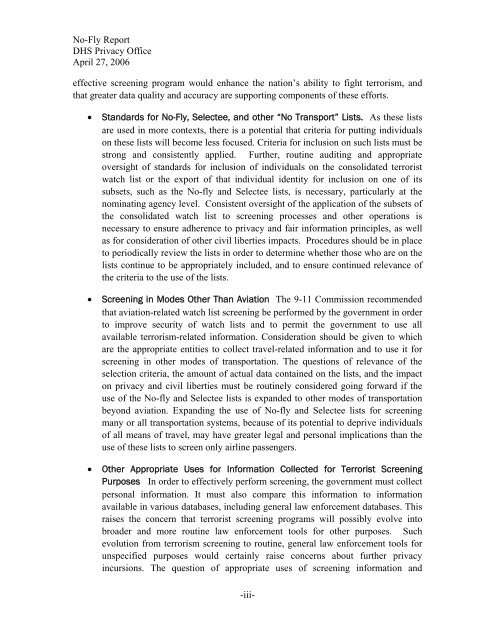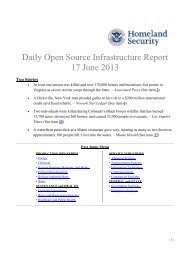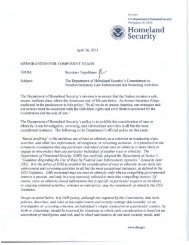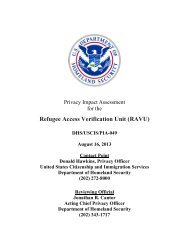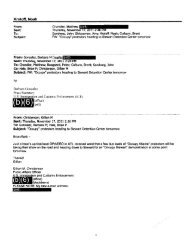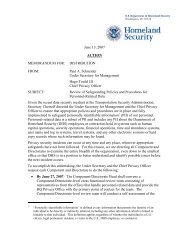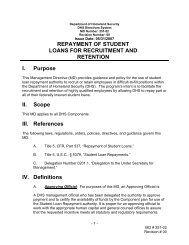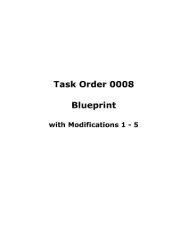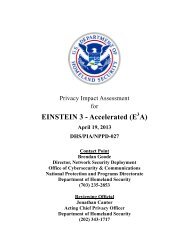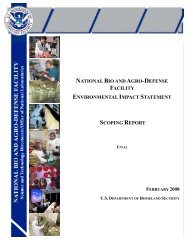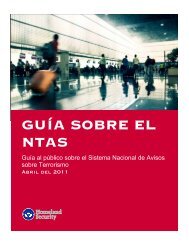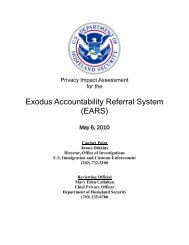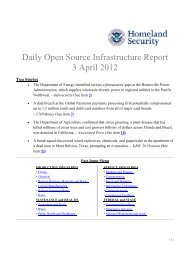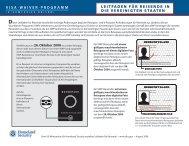Report: No Fly - Homeland Security
Report: No Fly - Homeland Security
Report: No Fly - Homeland Security
You also want an ePaper? Increase the reach of your titles
YUMPU automatically turns print PDFs into web optimized ePapers that Google loves.
<strong>No</strong>-<strong>Fly</strong> <strong>Report</strong><br />
DHS Privacy Office<br />
April 27, 2006<br />
effective screening program would enhance the nation’s ability to fight terrorism, and<br />
that greater data quality and accuracy are supporting components of these efforts.<br />
• Standards for <strong>No</strong>-<strong>Fly</strong>, Selectee, and other “<strong>No</strong> Transport” Lists. As these lists<br />
are used in more contexts, there is a potential that criteria for putting individuals<br />
on these lists will become less focused. Criteria for inclusion on such lists must be<br />
strong and consistently applied. Further, routine auditing and appropriate<br />
oversight of standards for inclusion of individuals on the consolidated terrorist<br />
watch list or the export of that individual identity for inclusion on one of its<br />
subsets, such as the <strong>No</strong>-fly and Selectee lists, is necessary, particularly at the<br />
nominating agency level. Consistent oversight of the application of the subsets of<br />
the consolidated watch list to screening processes and other operations is<br />
necessary to ensure adherence to privacy and fair information principles, as well<br />
as for consideration of other civil liberties impacts. Procedures should be in place<br />
to periodically review the lists in order to determine whether those who are on the<br />
lists continue to be appropriately included, and to ensure continued relevance of<br />
the criteria to the use of the lists.<br />
• Screening in Modes Other Than Aviation The 9-11 Commission recommended<br />
that aviation-related watch list screening be performed by the government in order<br />
to improve security of watch lists and to permit the government to use all<br />
available terrorism-related information. Consideration should be given to which<br />
are the appropriate entities to collect travel-related information and to use it for<br />
screening in other modes of transportation. The questions of relevance of the<br />
selection criteria, the amount of actual data contained on the lists, and the impact<br />
on privacy and civil liberties must be routinely considered going forward if the<br />
use of the <strong>No</strong>-fly and Selectee lists is expanded to other modes of transportation<br />
beyond aviation. Expanding the use of <strong>No</strong>-fly and Selectee lists for screening<br />
many or all transportation systems, because of its potential to deprive individuals<br />
of all means of travel, may have greater legal and personal implications than the<br />
use of these lists to screen only airline passengers.<br />
• Other Appropriate Uses for Information Collected for Terrorist Screening<br />
Purposes In order to effectively perform screening, the government must collect<br />
personal information. It must also compare this information to information<br />
available in various databases, including general law enforcement databases. This<br />
raises the concern that terrorist screening programs will possibly evolve into<br />
broader and more routine law enforcement tools for other purposes. Such<br />
evolution from terrorism screening to routine, general law enforcement tools for<br />
unspecified purposes would certainly raise concerns about further privacy<br />
incursions. The question of appropriate uses of screening information and<br />
-iii-


